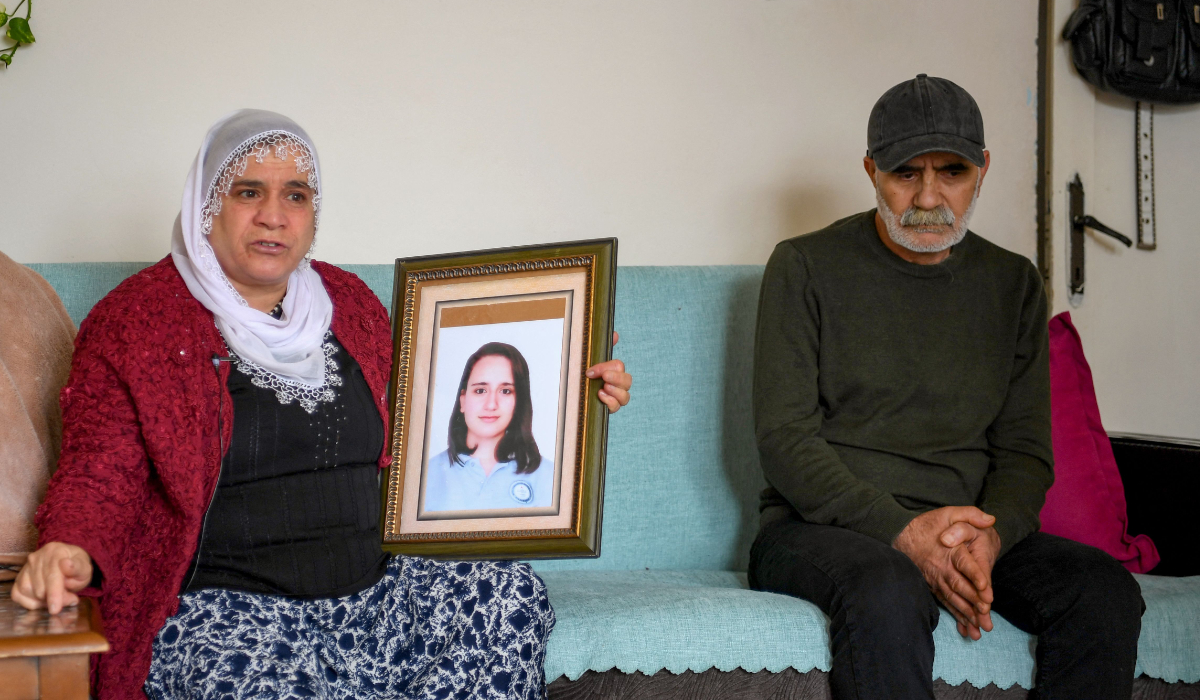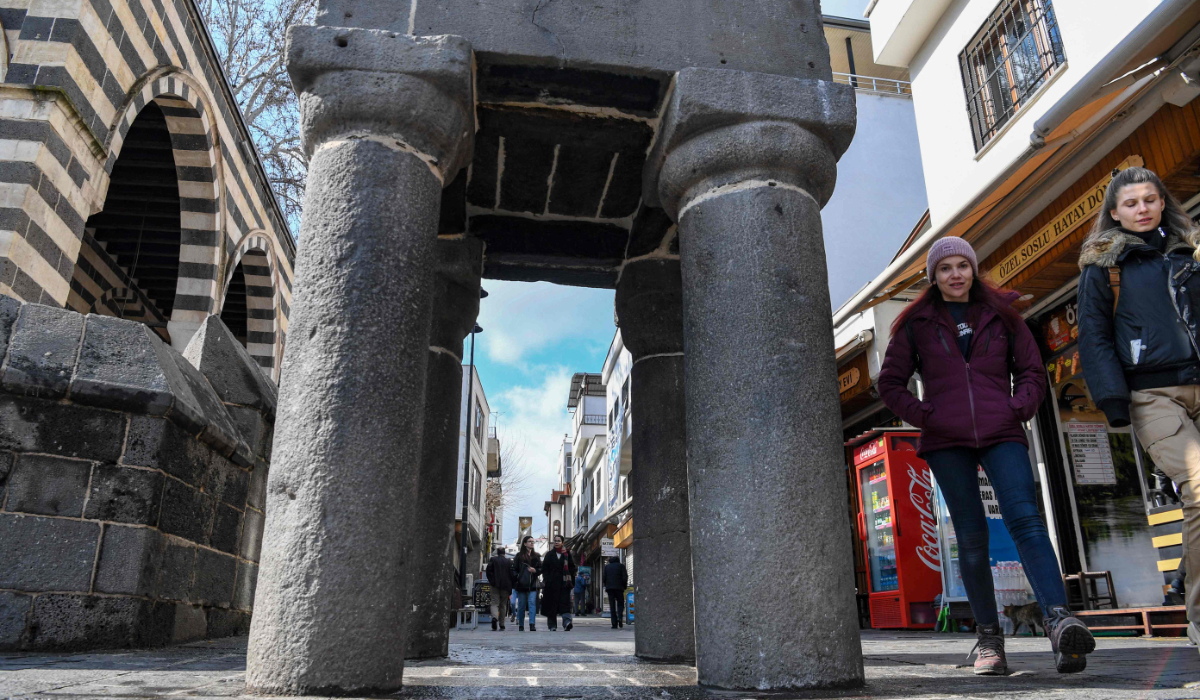DUBAI: If Arab countries really cared about Gaza, they would throw open their borders to Palestinian refugees. That is a claim made repeatedly by Israel since the Hamas-led attack of Oct. 7 last year sparked the conflict in the Gaza Strip.
According to Ambassador Hossam Zaki, assistant secretary-general to the Arab League, this argument is deeply flawed — ignoring the fact that Arab nations already host millions of Palestinian refugees.
Furthermore, Zaki believes this argument ignores the stark reality that once the people of Gaza are displaced, the Israeli government is unlikely to permit their return — opting instead to seize the land for the state of Israel.
“If we really want the truth, the Israeli wish is to see that the Palestinian population would disappear from the Occupied Territories,” Zaki told Katie Jensen, host of the Arab News current affairs program “Frankly Speaking.”
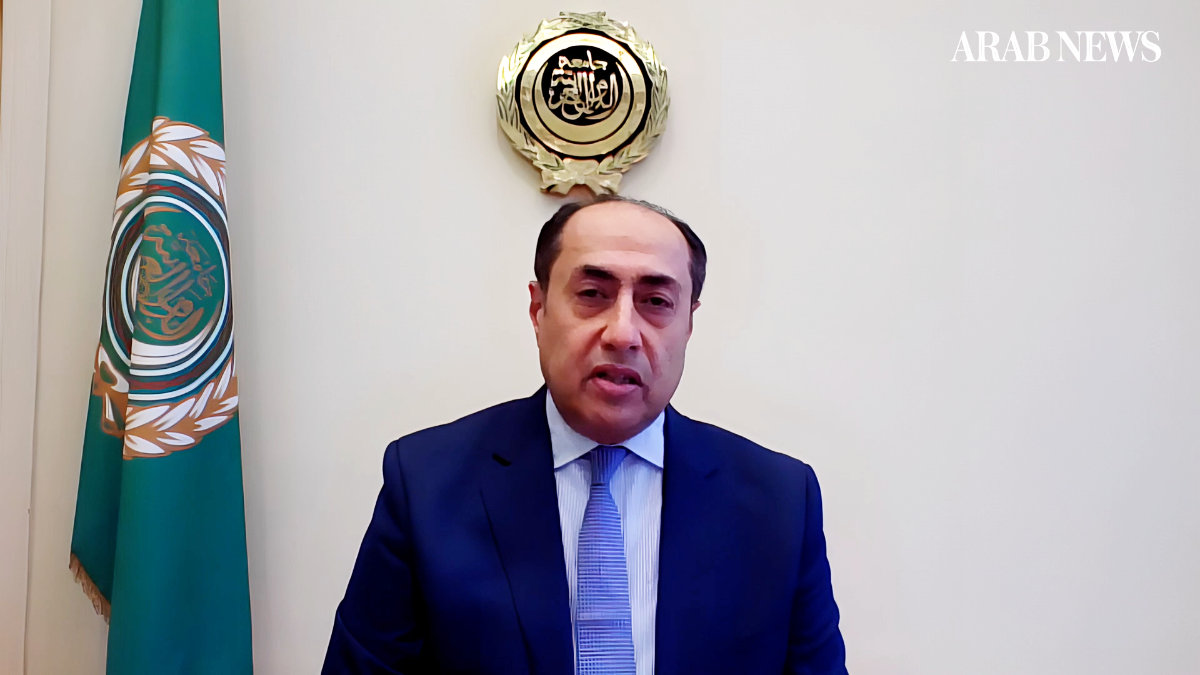
Hossam Zaki, assistant secretary-general of the Arab League, appearing on “Frankly Speaking.” (AN photos)
He added: “From the West Bank, East Jerusalem and Gaza, they would love for the Palestinians just to vanish. We all know that, because we know that they want the land. They want to grab the territory. They want to annex the territory to their state.”
In a wide-ranging interview, in which he discussed the forthcoming Arab League summit in Bahrain on May 16, efforts to halt Israel’s assault on Rafah, and the diminishing prospects for a two-state solution, Zaki said previous mass displacements would not be repeated.
“The Palestinians have learned from the mistakes of the past — from the 1948 war and 1967 war — that once they move out of their territory, the territory is confiscated by Israel, taken under control by Israel. And it seems to be such an uphill battle to get it back,” he said.
“The hope of getting back territory is ever so pale. So, what we are doing is, we are assisting the Palestinians to hold on to their territory, to hold on to their land, and not to move out of the land, because they know the consequences of moving out.”
Zaki was equally vehement in his rejection of the Israeli suggestion that the Arab states had failed to offer sanctuary to Palestinian refugees.
“They (the Israelis) can criticize us all they want,” he said. “We have Palestinians living in all Arab countries, some in refugee camps — very, very few — but most living like the normal citizens of these countries.
“In Egypt and in the Gulf countries, in Jordan, in North Africa, all Arab countries, you have Palestinians living.
“Normally, that is a criticism that we are willing to take, because we know that whatever is said in this regard means only to evacuate the territory for the benefit of the Israelis who want to grab it.”
Since the war in Gaza began seven months ago, the Arab League has been actively involved in trying to secure a ceasefire between Israel and Hamas, to arrange for sufficient aid to enter the enclave, and to keep the goal of Palestinian statehood on the agenda.
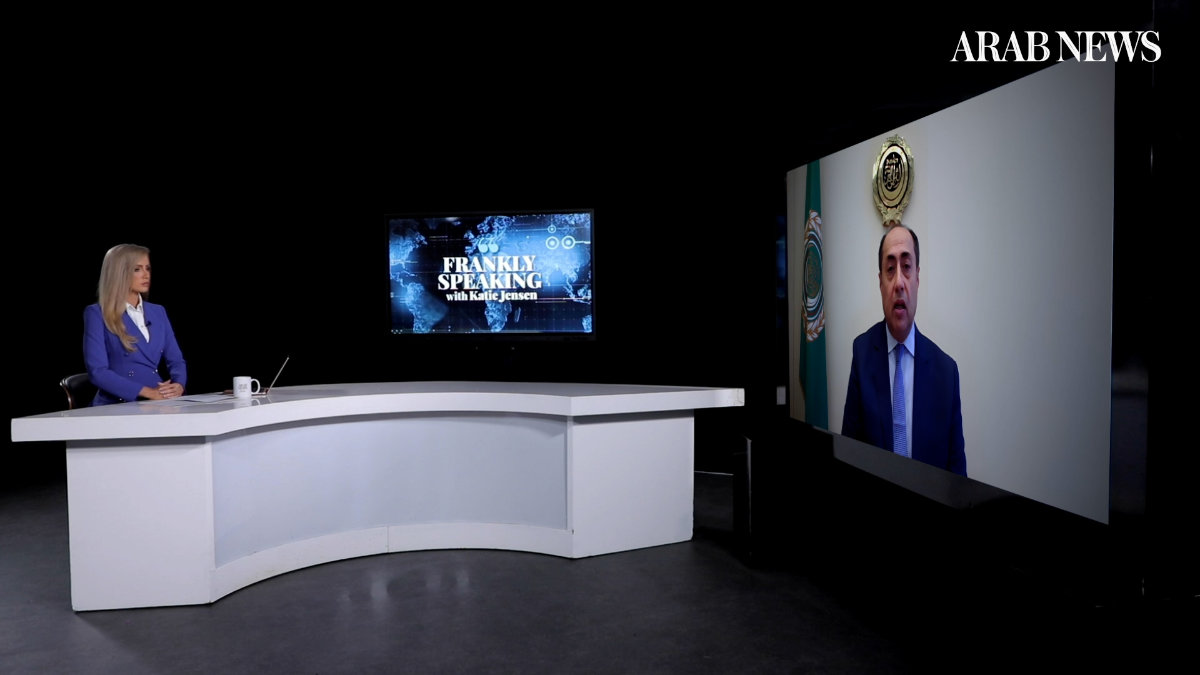
Hossam Zaki, assistant secretary-general of the Arab League, speaks to “Frankly Speaking” host Katie Jensen. (AN photos)
Zaki said the Arab League and its “heavyweight members” — including Egypt, Saudi Arabia, Qatar, the UAE, and Jordan — had continued to promote the Arab Peace Initiative, first unveiled 20 years ago, and were working to stop the “killing madness” continuing.
“But nothing has been successful so far,” he said. “Even the only resolution that the UN Security Council was able to adopt in order to stop the war, to cease the fire, was not implemented. It’s been adopted since, what, one month now? Nothing. As if there is nothing.”
Zaki believes Israel has been allowed to act with impunity owing to the protection and largesse of the US.
“Israel is basically a country that is pampered by the US, pampered by many of its allies, accomplices, so-called friends in the West,” he said.
“They condone what it is doing and they cannot stop it. They cannot stop this madness. Unfortunately, they gave it a carte blanche since the beginning and this is where we are.
“Seven months in this war — this criminal war — and nothing is happening. They are not capable of reigning in this country, this government of extremists.”
Asked whether the Arab League itself shares part of the blame for failing to bring an end to the conflict, Zaki laid responsibility entirely on Washington.
“Why would we — how could we — blame the Arab League?” he said. “The Arab League is not an accomplice in this. The Arab League is not giving bombs to Israel. The Arab League is not giving ammunition to Israel. The Arab League is not funding the Israeli aggression.
“The Arab League is a regional organization, a respectable regional organization, that is seeking peace, that is talking politics. It’s a diplomatic organization. We are willing to engage with whomever is seeking peace as well on the other side.
“Why do we say the US and the West? Because it is the US that’s funding Israel. It keeps transferring money to Israel, aid to Israel, munitions, bombs, weapons, whatever — you name it.”
Israel’s months-long bombardment and strangulation of aid flows has devastated Gaza’s infrastructure. Zaki believes Israel has deliberately sought to make Gaza inhospitable to compel the Palestinian population to abandon their land and accept refugee status abroad.
“The Israelis, in the nasty, very nasty, war against the Palestinians in Gaza, what they’re trying to do is not only to kill Palestinians … they did something which is much more nasty, actually: They have destroyed the infrastructure of the Gaza Strip,” he said.
“They’ve destroyed the health infrastructure, the education infrastructure, the water infrastructure, the electricity infrastructure. This is mean and malignant, and they want to make it a point for the Palestinians who remain in the Gaza Strip — most of the inhabitants — to find this place uninhabitable.
“When the war ends, all the Palestinians would look around and see that this has become totally uninhabitable, so they would want to leave. But surprise to them, I would tell you from now — and mark my words — that is not going to happen.
“They’re going to reconstruct their state, their country. They’re going to reconstruct Gaza, and the Arabs are going to help them. You bet on that. And the international community has enough decent people, enough peace-loving people, who believe in Palestinian rights and who will help them rebuild their country after all the crimes that Israel has committed there.”
Furthermore, Israel has threatened to take over the Philadelphi Corridor — a narrow strip of land along the Gaza-Egypt border, established under the Philadelphi Accord in 2005 and which authorized Egypt to deploy 750 border guards to police its side of the border.
If Israel were to seize control of the Philadelphi Corridor, it could undermine the 1979 Egypt-Israel peace treaty, in which Israel agreed to withdraw from the Sinai in exchange for peace with Egypt and created the current border that bisects Rafah.
“They are playing with fire, and I think they know that,” said Zaki, himself an Egyptian diplomat.
“Those who are taking decisions on the Israeli side are taking a big risk. I do not think that, in their right mind, they would want to see an undermining of the main pillar of peace in the region, which is the Egyptian-Israeli peace treaty of 1979.”
Preparations are underway for the 33rd Arab League summit, during which the leaders of the 22 member states will discuss common challenges facing the region.
With multiple conflicts blighting the Middle East and North Africa, Zaki said there would be “a hefty agenda” this year. “Obviously the issue of the war on Gaza is going to be left, right and center in all of this,” he said.
“Sudan is a big issue for us. The war on Sudan has not receded. It’s been going on for more than a year. It’s unfortunate. We need to address that. The situation in Libya. The situation with Yemen is still a problem. Syria is still an issue for us.
“And, we have a set of other socioeconomic resolutions that are prepared for the leaders to adopt in their meetings. So we do have quite a hefty agenda for our summit this year.”
High on that agenda will no doubt be the prospects of reviving the two-state solution for the Israeli-Palestinian conflict.
“There is no alternative to that solution,” said Zaki. “The Palestinians should have their own state. They should have their own independent contiguous state. Nothing should stand in their way and nothing, really, should justify assisting Israel in diluting this solution.”
But, given the destruction in Gaza, the ongoing spread of settlements in the West Bank, and the deep hostility felt on both sides, some might argue the region is moving further away from the two-state solution.
“No, we’re not moving further away,” said Zaki. “I think the world — which has pretty much paid lip service to this two-state solution for a couple of decades now — is now realizing that, well, lip service is not useful anymore, and we should really engage in active steps, like many European leaders have been saying, active steps.
“Even US Secretary of State Antony Blinken said that several months ago. We should all engage in active steps to make true the Palestinian state — to make it come about and to make it a reality.
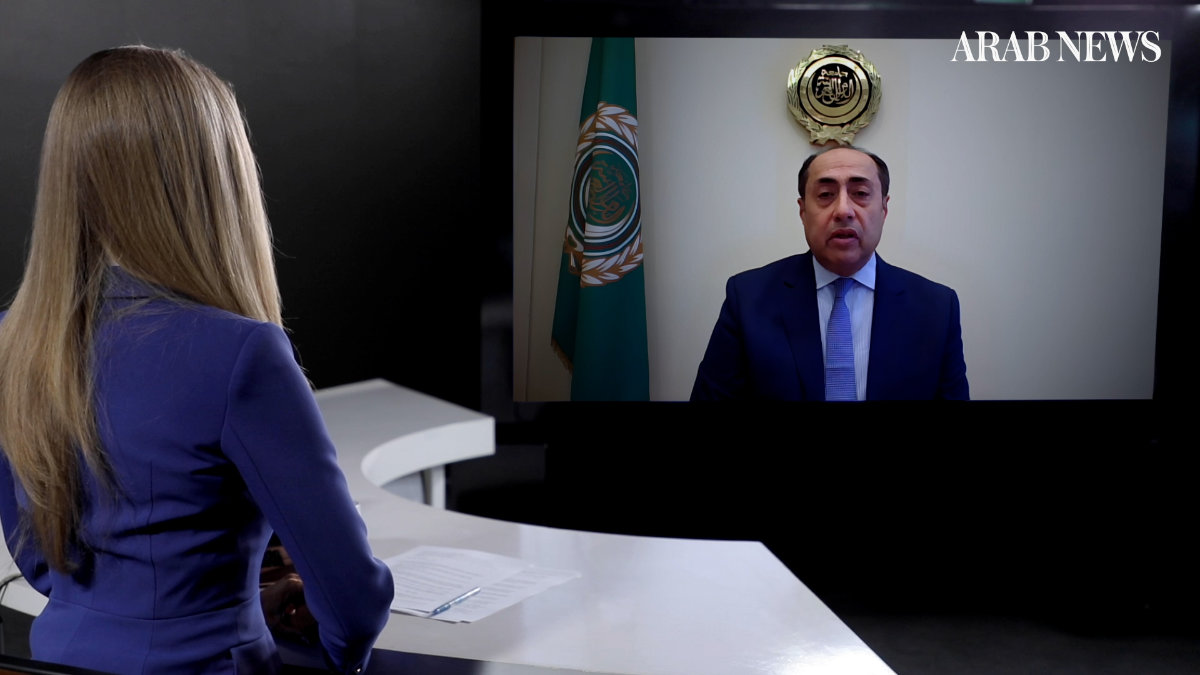
Hossam Zaki, assistant secretary-general of the Arab League, speaks to “Frankly Speaking” host Katie Jensen. (AN photos)
“This is going to happen in the UN; one step closer, one step closer to Palestinian statehood. And things are going to move in this direction.
“The Israelis will have to resist that as they want to, and as they refuse to engage in peace talks, and they refuse to agree on Palestinian statehood. But it’s not up to them.
“We are trying to convince the rest of the world, especially the Western world, that Palestinian statehood should not be subject to an Israeli veto. Because if we do give the Israelis the veto over this, I think they will never agree on it. And a Palestinian state will never see the light of day.”





